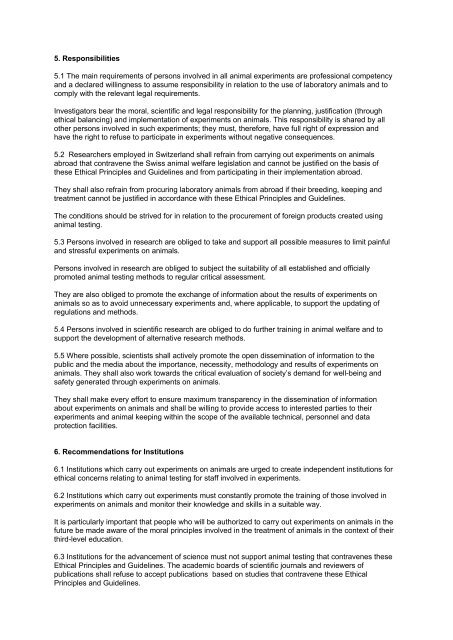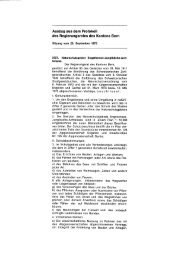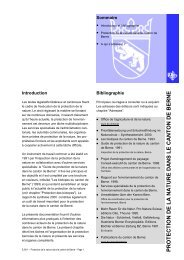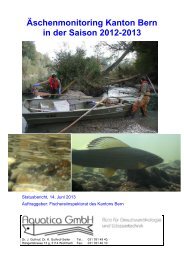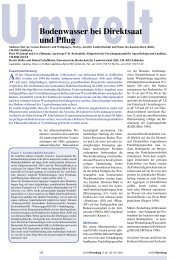Ethical Principles and Guidelines
Ethical Principles and Guidelines
Ethical Principles and Guidelines
- No tags were found...
Create successful ePaper yourself
Turn your PDF publications into a flip-book with our unique Google optimized e-Paper software.
5. Responsibilities5.1 The main requirements of persons involved in all animal experiments are professional competency<strong>and</strong> a declared willingness to assume responsibility in relation to the use of laboratory animals <strong>and</strong> tocomply with the relevant legal requirements.Investigators bear the moral, scientific <strong>and</strong> legal responsibility for the planning, justification (throughethical balancing) <strong>and</strong> implementation of experiments on animals. This responsibility is shared by allother persons involved in such experiments; they must, therefore, have full right of expression <strong>and</strong>have the right to refuse to participate in experiments without negative consequences.5.2 Researchers employed in Switzerl<strong>and</strong> shall refrain from carrying out experiments on animalsabroad that contravene the Swiss animal welfare legislation <strong>and</strong> cannot be justified on the basis ofthese <strong>Ethical</strong> <strong>Principles</strong> <strong>and</strong> <strong>Guidelines</strong> <strong>and</strong> from participating in their implementation abroad.They shall also refrain from procuring laboratory animals from abroad if their breeding, keeping <strong>and</strong>treatment cannot be justified in accordance with these <strong>Ethical</strong> <strong>Principles</strong> <strong>and</strong> <strong>Guidelines</strong>.The conditions should be strived for in relation to the procurement of foreign products created usinganimal testing.5.3 Persons involved in research are obliged to take <strong>and</strong> support all possible measures to limit painful<strong>and</strong> stressful experiments on animals.Persons involved in research are obliged to subject the suitability of all established <strong>and</strong> officiallypromoted animal testing methods to regular critical assessment.They are also obliged to promote the exchange of information about the results of experiments onanimals so as to avoid unnecessary experiments <strong>and</strong>, where applicable, to support the updating ofregulations <strong>and</strong> methods.5.4 Persons involved in scientific research are obliged to do further training in animal welfare <strong>and</strong> tosupport the development of alternative research methods.5.5 Where possible, scientists shall actively promote the open dissemination of information to thepublic <strong>and</strong> the media about the importance, necessity, methodology <strong>and</strong> results of experiments onanimals. They shall also work towards the critical evaluation of society’s dem<strong>and</strong> for well-being <strong>and</strong>safety generated through experiments on animals.They shall make every effort to ensure maximum transparency in the dissemination of informationabout experiments on animals <strong>and</strong> shall be willing to provide access to interested parties to theirexperiments <strong>and</strong> animal keeping within the scope of the available technical, personnel <strong>and</strong> dataprotection facilities.6. Recommendations for Institutions6.1 Institutions which carry out experiments on animals are urged to create independent institutions forethical concerns relating to animal testing for staff involved in experiments.6.2 Institutions which carry out experiments must constantly promote the training of those involved inexperiments on animals <strong>and</strong> monitor their knowledge <strong>and</strong> skills in a suitable way.It is particularly important that people who will be authorized to carry out experiments on animals in thefuture be made aware of the moral principles involved in the treatment of animals in the context of theirthird-level education.6.3 Institutions for the advancement of science must not support animal testing that contravenes these<strong>Ethical</strong> <strong>Principles</strong> <strong>and</strong> <strong>Guidelines</strong>. The academic boards of scientific journals <strong>and</strong> reviewers ofpublications shall refuse to accept publications based on studies that contravene these <strong>Ethical</strong><strong>Principles</strong> <strong>and</strong> <strong>Guidelines</strong>.


